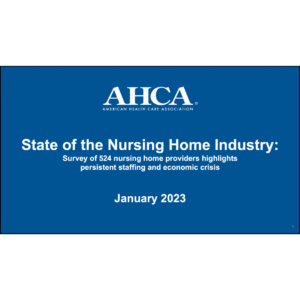New Report Sheds Light on How Staffing Challenges Limit Hospital Discharges
CarePort has released its annual report, “The Evolution of Care,” which examines the effects that the COVID-19 pandemic had on healthcare delivery. It also includes insights on evolving challenges in the industry, including the difficulty hospitals face in placing patients and how staffing shortages are affecting the senior care industry.
Here, we examine the findings of the report and its implications for the senior care industry.
Developing the Report
 CarePort is powered by WellSky, a health and community care technology company which supports more than 2,000 hospitals and 130,000 post-acute care providers nationwide. Together, these providers coordinate care for more than 13 million patients each year.
CarePort is powered by WellSky, a health and community care technology company which supports more than 2,000 hospitals and 130,000 post-acute care providers nationwide. Together, these providers coordinate care for more than 13 million patients each year.
The report is based on CarePort’s data and examines the changing methods of care delivery over the past year, particularly in light of the end of the COVID-19 Public Health Emergency (PHE) on May 11, 2023. The report reveals several key findings impacting the senior care industry.
Growing Referral Volume
According to the report, hospital referral volume to skilled nursing facilities has grown by 10% since 2022, and referral volume to home health agencies is higher than it was pre-pandemic. The report notes that the number of referrals per patient sent to skilled nursing facilities and home health agencies has doubled, on average, and home health agency rejection rates have increased by an average of 40%, hitting a high of over 76% in December 2022.
The increased referral volume and higher denial rates may be caused by increased staffing shortages.
Higher Patient Acuity
In addition to a rising demand for care, CarePort’s data shows that patients in the hospital are now 6% more acute at discharge, compared to 2019 averages. When patients are more acute, they often have more complex care needs, and may require more post-discharge services such as medication management and physical therapy. The increased care needs make it more challenging to facilitate a smooth transition from the hospital into a care setting.
CarePort’s data reports that patients who were referred to post-acute care settings experienced a 17% increase in neurological disorders from 2019 to 2022. During that same time period, patients experiencing alcohol-use disorders increased by 16%, drug-use disorders increased by 12%, pulmonary circulation diseases increased by 8%, and psychoses increased by 3%. Such care needs increased the length and complexity of hospital stays, as well as the number of referrals required upon discharge, putting more strain on an already understaffed healthcare industry.
Ongoing Staffing Challenges
Staffing challenges continue to be an issue in the healthcare industry. The National Investment Center for Seniors Housing and Care reports that the skilled nursing industry staff shortages are highest among skilled nursing workers. Healthcare operations are increasingly turning to staffing services to help fill that gap, and the use of contrast staff has increased threefold since the pandemic.
According to the report, 54% of nursing homes are denying patients because of staffing challenges, and 61% of nursing homes are limiting new admissions. The report states that 87% of nursing homes are facing moderate or high staffing challenges.
How the End of COVID-19 PHE Impacts the Senior Care Industry
With the end of the COVID-19 national emergency in May, the senior care industry is poised to see several positive impacts. During PHE, hospitals weren’t required to share certain information, such as providing a full list of post-acute care providers or quality metrics about those providers. The end of the national emergency revokes those flexibilities, which can increase patient access to information and improve overall transparency.
During the pandemic, the Centers for Medicare & Medicaid Services (CMS) expanded reimbursement for hospital-at-home services. CMS has extended the Acute Hospital Care at Home waiver through December 31, 2024, meaning hospitals can continue to provide and bill for hospital-at-home services. The extension allows patients to continue to access this valuable service, and indicates that we might see hospital-at-home services become a lasting resource in healthcare.
Looking Forward
The CarePort study highlights some of the impacts the COVID-19 pandemic had on the senior care industry and examines the significant challenges that staffing shortages have created. From nursing homes denying patient referrals because of staffing limitations to the difficulties hospitals face in arranging for proper care after patient discharges, these challenges are all closely linked. While certain changes, like the extension of hospital-at-home services coverage by CMS, are positive, the senior care industry still needs to do more to address the staffing problem, or risk facing ongoing complications that ultimately affect quality of care.

Paige Cerulli is a contributing writer to i Advance Senior Care.
Related Articles
Topics: Facility management , Featured Articles , Staffing











